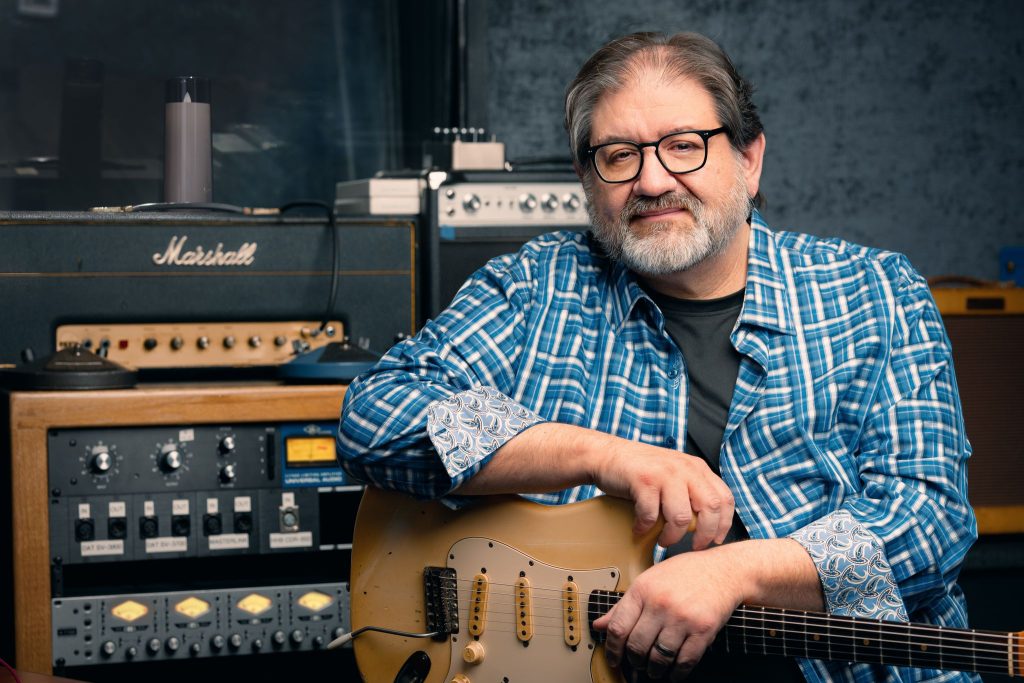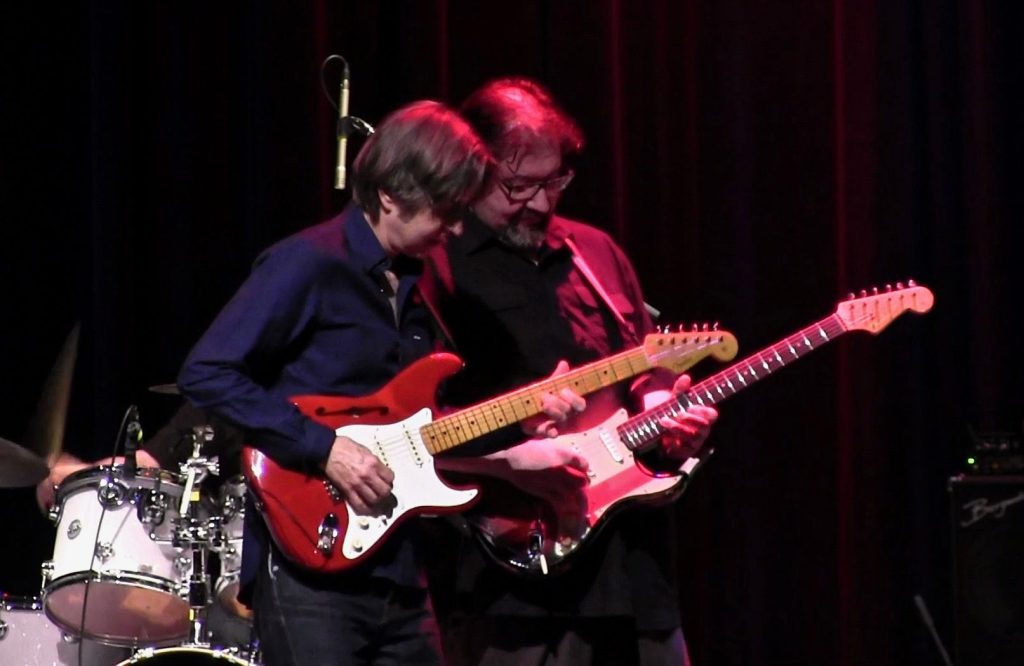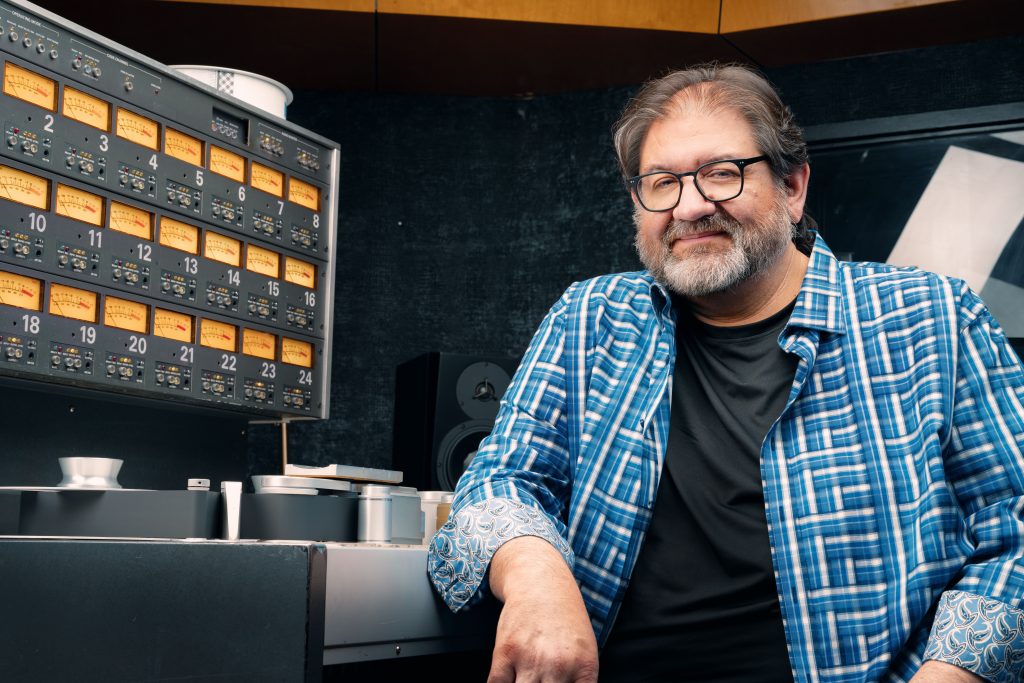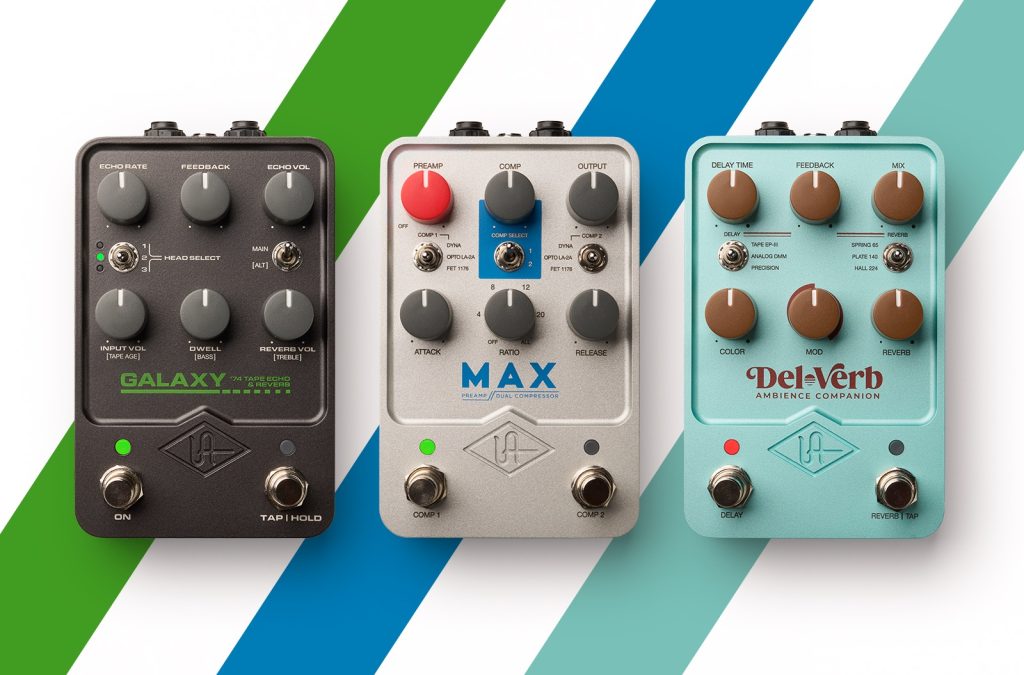James Santiago
Los Angeles, California
Universal Audio
https://www.uaudio.com/
How long have you been a musician? How did you get into it in the first place?
I started playing guitar around 5 years old, and at around 15, I began working in professional working bands as musicians around town started asking me to play with them. I didn’t have a driver’s license back then, so I had to have my mom or other band members take me to band practice!
I had to learn nearly 100 cover songs in all genres for different gigs, so it was incredible training for me to work on getting the tone and phrasing as close as possible to the original songs. It sharpened my ears, and, being a broke teenager lead me to learn electronics and how to fix my own gear. I fell into it and it’s all I wanted to do. There was no plan B! And now it’s been about 36 years of learning songs and working on tones.
Who have been some of your major musical influences, past or present?
My parents listened to a lot of Motown and R&B. That’s likely why my first guitar hero was George Benson when I was probably 10 years old. However, The Police totally re-wired my brain. I couldn’t figure out how Andy Summers got his sounds. His chords and ambient sounds blew my mind. That’s what inspired me to get my first analog delay, chorus/flanger, compressor and so on.
Then, I heard Eric Johnson and it sent me down the lead tone rabbit hole. He used many of the same tools as Andy Summers, but in a very unique way. I blame those two for my obsessions with Echoplex tape delays and expensive jazz chords, but in rock/pop settings.
Did you have formal schooling, or are you self-taught? Take us through that story:
I started college and got through my first couple years before I made the decision to quit to focus on music. I was going to school in the morning, teaching guitar in the afternoon, and playing gigs all night. It was full on music for 18 hours a day at that time, and I loved it.
All my music theory came from studying books on my own and learning from the older musicians I was working with. School just wasn’t moving fast enough for me.
The same thing happened with electronics. I went to the library and read books on it. In fact, I remember being 16 and fixing the family VCR after a library visit.
To this day, I still buy the books based on college courses I wish I could attend. Every day there’s something new to learn. I want to go back to school and get my degree.
How did UA decide to get into the pedal market, after having so much success with the DAW/Plug-Ins aspect of music creation?
Nearly everyone at UA plays guitar and loves pedals, from Bill Putnam to the heads of sales, marketing, product development and engineering. Making pedals was something everyone wanted to do for a long time. We have such a great team of pedal geeks, including my design partner Tore Mogensen who spent many years at TC Electronic. We had a shared vision to make a powerful, studio quality pedal line that could sound like all the vintage hardware we all wanted, and we did. And, there’s more to come!
What drives you as far as new pedal creation is concerned? How long does it typically take for an idea to come full circle and become a demo pedal? What’s the process behind new gear, and the eventual release of it to the public?
Many of the products we’ve released recently have taken two or three years in total.
When we decided to create Dream, for example, it took months to find a vintage Deluxe Reverb unit I thought was worthy of “golden unit” status. That’s not to say there aren’t good sounding ones out there, but I wanted a great one. So between that search and having to invent new algo techniques during the process, it can take a long time.
Others examples, like our new Del-Verb pedal, was something fun we wanted for ourselves. We already had the Golden Reverb and Starlight Delay out and thought how much we all wanted a single pedal that could do both! But even then, that takes a year when it comes to mechanical and software testing, app design and more. Right now, we have years worth of releases coming out, and I’m excited to see them finally makes it out of the lab!
What are some of the biggest concerns facing your profession today?
I think the pedal industry will always be okay. I know when I was coming up, even if I couldn’t afford a new guitar or amp, I could usually scrap up some money for a used pedal. And, there are some amazing pedals in all price ranges and formats now. You really can get high quality studio tones or broken tape delays in a small footprint now.
However, the thing that concerned me 10 years ago is the same one today, and that is how much of the original gear in digital products is unobtainable now. And, they’re just too unreliable and loud for performing in most situations with in-ear monitors.
My big fear is that we’ll forget what the real gear sounded like at a great gig or recorded in a killer studio with a great mic collection. That’s what I was used to and I’m hoping to keep that sonic history around as much as I can.
Where do you see pedal building going in the future?
We’ve come a long way from a couple transistors in a fuzz. I’ll be curious what the next big game changing effect will be. For now, I’ll just make some popcorn and watch what the next great pedal designer has up their sleeve!
Who are some of your favorite builders in the industry right now?
I really like what Meris is doing. There’s always a sonic twist to their products that I dig. I also just got a JHS Artificial Blonde vibrato that’s great! I think Keeley has been doing fantastic pedals as well. Plus, I still bug Jeorge Tripps at Way Huge/Dunlop about Fuzz Face pedals and have many odd transistor variations he’s made for me. Honestly, I really love pedals and will never get tired of them.
Name the last 5 records you listened to:
1. Maddison Cunningham – REVEALER
2. Claude Debussy – DEBUSSY FAVOURITES
3. Bob Weir – HEAVEN HELP THE FOOL
4. Queens of the Stone Age – RATED R
5. Donald Fagen – MORPH THE CAT
UA has some new pedals about to be released – what insight can you give us on those?
We have released have Galaxy ‘74 Tape Echo & Reverb, Del-Verb Ambience Companion and Max Preamp/Dual Compressor.
Galaxy gives you the classic sound of the old Space Echo tapes units with multiples heads, and the reverb tank as well.
Del-Verb is fun for me because it’s like having a Starlight and Golden in a single pedal. I love using the analog delay with 224 digital reverb together. Plus, I can still make it an EP3 and spring reverb if I need it. It’s a one stop delay and reverb shop!
Max brings all the great studio compressors like LA-2 and 1176 with our 610 tube preamp in a single stompbox. Plus you can stack them any way you want. So you can do 2 stacked 1176 units, or an LA-2 into an 1176 cranked if you want. Lots of options there!
Klon hype: Love it or Hate it?
Love the design, hate the used market price!
Any last comments, or anything you’d like to talk about?
Nope, thanks for having me!
Thanks so much to James for taking the time to answer some questions! Make sure to go check out the Universal Audio website and explore all the wonderful gear they have! Cheers!
Other interviews you might enjoy:
Rich Good of The Psychedelic Furs
Richard Fortus of Guns ‘N’ Roses
Greg Loiacono and Tim Bluhm of The Mother Hips
Affiliate Links:
Sweetwater – https://sweetwater.sjv.io/MX05KP
Vintage King – https://vintagekingaudio.sjv.io/nLGZd7
StewMac – https://stewmac.sjv.io/P0X7BQ
Amazon – https://amzn.to/3FN04Mq
GET EXCLUSIVE UPDATES, CONTEST INFO, SEE OUR LATEST DEMO VIDEOS AND MORE:




















